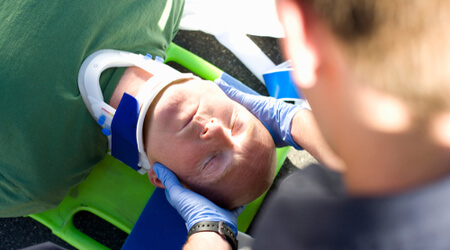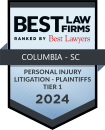
One of the two major types of traumatic brain injury (TBI) is the closed-head injury. This is a TBI that happens when a sudden jolt or blow to the head moves the brain violently within the skull, causing brain damage.
The other type is a penetrating brain injury, in which the skull is pierced.
A minor closed-head injury may cause temporary dysfunction of brain cells, making the victim feel dazed, confused or knocked out.
Severe TBI may result in bruising, torn tissues, bleeding and other physical damage to the brain that can result in long-term complications or even death.
A closed-head injury may be caused by many kinds of incidents, including:
- Slip-and-fall accident
- Car crash
- Being hit by or slammed against something
- Workplace accidents
- Sports injuries
- Physical assault
Let Our SC Lawyers Handle Your Closed-Head Injury Claim
If you or a loved one has suffered a closed-head injury in a fall, a car accident, on-the-job injury or another accident, you are likely to be facing mounting medical bills. If the accident that caused the TBI was someone else’s fault, that person may owe you compensation.
Call Joye Law Firm. If your closed-head injury resulted from someone else’s negligence, we can work to help you get money for medical expenses, physical therapy, lost income and other losses.
How Closed-Head Injuries Harm Victims
TBI caused by closed-head injuries are sometimes called the “invisible disability” because the damage and its effects cannot be seen. TBI can cause cognitive problems (thinking, remembering), communication problems (speech, reading, writing), sensory problems (hearing, sight, touch), lasting behavioral and emotional changes and degenerative brain disease.
Closed-head injuries may cause two types of brain damage:
- Primary brain damage, which is injury that occurs at the time of impact.
- Secondary brain damage, which evolves over time after the trauma.
Primary brain damage from the force of a blow that causes a closed-head injury may include:
- Contusions (bruises) at the point of impact or opposite the impact where the force of it has slammed the brain against the inside of the skull.
- Lacerations (cuts) or tearing on the frontal and temporal (side) lobes or among blood vessels caused as the brain rotates across the hard ridges of the skull.
- Hematomas (blood clots) inside the brain or between the skull and the brain.
- Nerve damage (diffuse axonal injury) from the cutting or shearing force of the blow on nerve cells in the brain’s connecting nerve fibers.
Potential secondary brain damage includes, but is not limited to:
- Swelling (edema)
- Increased intracranial pressure (inside of the skull)
- Brain infection
- Hematoma (blood clot)
- Epilepsy
Because the brain controls all functions of the body, brain damage can also eventually cause changes to the body’s cardiac (heart) and pulmonary (lung/breathing) functions, including regulation of blood pressure and carbon dioxide levels – and even the body’s ability to absorb and process nutrition.
Compensation for Closed-Head Injuries Caused by Negligence
A closed-head injury victim may face a long, difficult and expensive recovery. In many cases, the brain damage is such that victims will be permanently disabled and will require care for the rest of their lives.
Joye Law Firm can help you recover the compensation you deserve if someone else was responsible for your or your loved one’s closed-head injury. We understand the complex medical, legal and emotional issues related to TBI injuries. We can seek compensation to pay for medical expenses, including therapy, rehab and job retraining, and for lost income and pain and suffering.
If you or a close relative has suffered a closed-head injury in a South Carolina car accident, workplace accident or slip-and-fall or other accident that was not your fault, our TBI team can help you obtain the compensation you deserve. We investigate accidents thoroughly and work with medical and financial specialists to fully document our clients’ losses.
Call Joye Law Firm now or fill out our online form for a free and confidential evaluation of your case.
Sources:



























